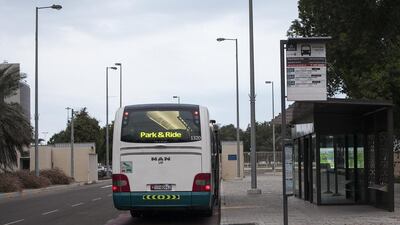Soon after I came to know about the "Park and Ride" initiative from an article in your newspaper (Business is slow for free bus, January 20), I started taking advantage of it. I have to admit that it has been one of the best government initiatives to ease congestion in the capital.
If successful, it will help reduce pollution, as well as enabling thousands of people to save money on transport.
When I read the article, I was surprised to know that the bus tickets offer free rides all day, on the park-and-ride express as well as all public buses within Abu Dhabi island. Till now, I had the impression that nothing comes for free in this city.
I am sure that those who live outside the city will gradually start to rely on this facility.
I thank the Department of Transport for implementing this scheme. I just wish I had known about it before.
It’s unfortunate that this initiative is not getting the publicity it deserves, but I am trying to spread the word.
Philp John Varghese, Abu Dhabi
Bad options lead to piracy
With reference to the editorial Taking on the high tech pirates (January 22), content producers should think like consumers, not like pirates. Most people are willing to pay for content if it is instantly available and easily accessible. They are willing to torrent when they can't find a way to pay for and access the content they want.
A few points to consider. If, for instance, iTunes in the UAE had a greater portion of their library of movies and uncensored TV shows available to buy, or if there was a great deal more available than they have at present, I suspect that piracy would drop significantly.
Then again, no one wants to pay for cable packages anymore. It seems pointless to pay for thousands of channels that you will never watch, just to have the two or three TV shows and football games that you want. For now, I pay for a cable package, but I resent being charged extra to watch the Premier League.
It is not that media companies need to think like pirates, but they need to start providing services that consumers want, at a reasonable price and deliver them in an appropriate and timely manner. Let people buy things the way they want rather than giving them just two options: pay more money or become a pirate. It’s time for media companies to find another option.
Last but not least, isn’t it time to end internet borders? Let people buy from the iTunes USA or UK site, or any other site, no matter where in the world they are.
When I can order movie DVDs from the UK and have them delivered to me here, why shouldn’t I be able to download that same content from the same site?
Ann Scholl, Dubai
People are increasingly savvy and it is no longer possible to foist channel subscriptions on them.
The more barriers erected by censors and protectionists, the greater the incentive for people to find ways around them, and the more revenue opportunities lost. Atomise the media, open it up to everyone, and let consumer choice prevail.
Sohan Dsouza, Dubai
Nigeria itself did not mourn
I refer to Ayesha Almazroui's opinion article We must mourn Nigeria's dead just as much (January 19) and the subsequent question posed on your Facebook page – why didn't we mourn the victims of the Nigeria massacre by Boko Haram the way we did those of the Charlie Hebdo attack?
I think the simplest answer to this question is that the French government initiated the mourning and others joined in. What concern did the Nigerian government show for the victims of the rampage by Boko Haram?
Jeen Cherian George, Dubai
The world is not responsible for Nigeria, just as it is not responsible for France. France’s leadership led the way in mourning the victims of the attacks.
Also, it is not true that 2,000 people have been killed by Boko Haram in a village in one day. That maybe the total number of people killed by Boko Haram over time.
Irrespective of the numbers, Nigeria must care for and guard its own people. To do so, it has to go after the arms suppliers.
Name withheld by request

